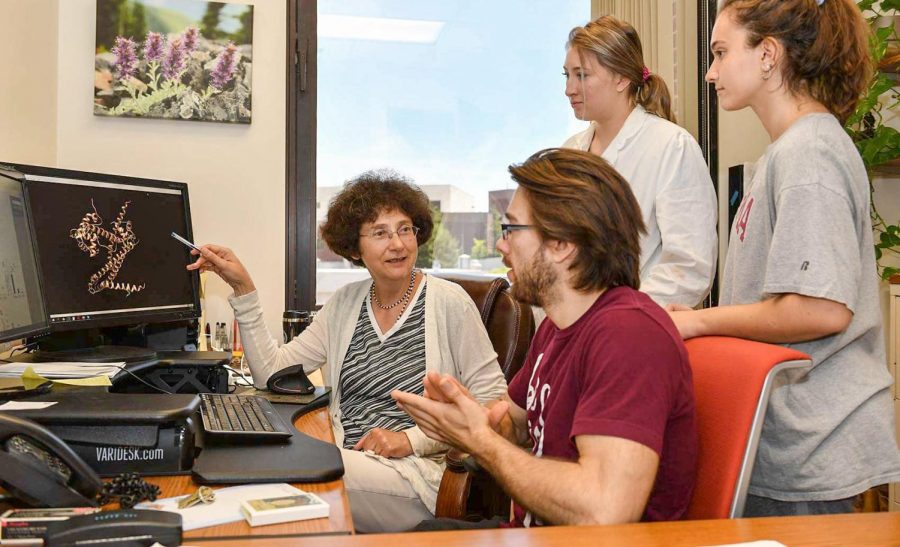WSU awarded $2 million in NIH funding to support underrepresented student researchers
WSU received $1.3 million MARC grant in June 2021, $700,000 MIRA grant seven months earlier
COURTESY OF THE VOILAND COLLEGE OF ENGINEERING AND ARCHITECTURE
Pictured is Co-Principal Investigator Alla Kostyukova with students. Kostyukova serves as one of three Co-PI’s for WSU’s MARC program.
June 25, 2021
WSU received a $1.3 million Maximizing Access to Research Careers grant from the National Institutes of Health to support underrepresented student researchers pursuing a biomedical research career.
The NIH awarded the five-year grant to WSU this month, said Mary Sánchez Lanier, WSU’s Division of Academic Engagement and Student Achievement assistant vice provost and School of Molecular Biosciences professor.
WSU launches its MARC program starting in fall 2021, a two-year program federally funded by the NIH that will continue for the next five years. The program provides guidance and financial support to undergraduates from underrepresented backgrounds in the biomedical field who plan on pursuing a doctoral degree, Sánchez Lanier said.
“In the United States, we need people from all backgrounds to solve our biomedical challenges,” she said. “There are large groups of people in the United States that are less likely to go on and get a doctorate degree and continuing research — individuals who come from more disadvantaged backgrounds.”
Eligibility for the MARC program is complex. Applicants must meet at least one of the three underrepresented background eligibility requirements, Sánchez Lanier said.
Students from traditionally underrepresented racial or ethnic groups in science and engineering fields and students who experienced homelessness, among other criteria, are eligible. She said students can learn more about eligibility requirements on the MARC program’s eligibility page.
The grant awards four juniors accepted into the MARC program $10,000 toward tuition and fees. In addition, the juniors will receive $13,600 each year of the program starting this 2021-2022 academic school year, Sánchez Lanier said.
July 1 is the priority deadline for students to apply to the MARC program. However, if program placements go unfilled after the deadline, application submissions will remain open until mid-August, she said.
Co-principal investigators and training faculty for WSU’s MARC program will help evaluate student applications, Sánchez Lanier said.
Sánchez Lanier said she serves alongside Samantha Gizerian, Department of Integrative Physiology and Neuroscience associate professor and Alla Kostyukova, Voiland School of Chemical Engineering and Bioengineering associate professor as the three Co-PI’s for WSU’s MARC program.
As Co-PI’s, Sánchez Lanier said Gizerian, Kostyukova and her applied for the MARC grant and helped establish WSU’s MARC program. They started writing and applying for the grant in 2019 and submitted it in June 2020.
“As a nation and as a university, this is important,” Sánchez Lanier said. “That’s why this amount of money is being invested in these students. It’s important to the students, it’s important to our university, but [it’s] also important to the economic success of the United States, the future of research in the United States and whether we continue to be world leaders.”
WSU also received a $700,000 Motivating Innovation and Research Achievement grant from the NIH seven months before receiving the MARC grant. The grant allows WSU to launch its MIRA program starting this academic school year, she said.
The MIRA program is also for undergraduates from underrepresented backgrounds who plan on pursuing a career in biomedical research. Unlike the MARC program, the MIRA program is intended for incoming freshmen accepted into WSU’s Honors College, Sánchez Lanier said.
The five-year MIRA grant awards selected students $12,000 per academic year and $4,000 towards summer research with a faculty mentor up to four years, according to the Honors College website.
Sánchez Lanier said five students have already been accepted to the MIRA program. The program is limited to five students.
Liyon Mehari, incoming freshman biology major, said she got accepted into the MIRA program in May.
“I was beyond thrilled,” she said. “When I got [in], I screamed. It was absolutely the best thing that has ever happened to me.”
One of Mehari’s long-term goals is to attend medical school and become a cardiothoracic surgeon. She said the MIRA grant will allow her to meet people that can help her advance her career.
Madison Holdway, incoming freshman animal science major, said she first heard about the MIRA program in April. An email sent from WSU and Sánchez Lanier encouraged her to apply.
“I was thrilled, super grateful and honored,” Holdway said. “The scholarships I receive through this program, plus the opportunities I’ll get, completely changed my school experience. As of right now, my college is completely paid for.”
Holdway wants to become a veterinarian. After getting into the MIRA program, she said she has become more open to wanting to pursue a career in research. Holdway is interested in researching how diseases affect different animals.
Holdway and Mehari said they both will consider applying to the MARC program when they become juniors.










